From inside (document excerpt):
Operating Manual ID CoolTech ID Refrigerant Identifier Model 16900 Table of Contents Safety Precautions . 2 Overview 4 Hardware Descriptions 6 Hardware 6 Sample Hoses 7 Power Harnesses 8 R-134a Tank Adapter Fitting 8 Storage Case . 8 Operating Procedure 9 Pre-Operation Inspection 9 Operating Procedure . 9 Post-Operation Procedure 13 Error Codes 14 Error Codes and Corrective Actions . 14 Maintenance 17 Sample Filter Replacement .
Heating, Ventilating and Air Conditioning User Manual Free Download. HAVC Operator’s Manual. Auto AC Free Instruction Manual Download PDF.
17 Sample Hose Inspection and Cleaning . 18 Air Detection Sensor Replacement 19 Replacement Parts 20 Specifications 21 Warranty . inside back cover 16900 CoolTech ID Refrigerant Identifier 1 Safety Precautions WARNING : To prevent personal injury: · Study, understand, and follow all warnings in this manual before operating this unit. If the operator cannot read these instructions, operating instructions and safety precautions must be read and discussed in the operator’s native language. –Si el operador no puede leer las instrucciones, las instrucciones de operación y las precauciones de seguridad deberán leerse y comentarse en el idioma nativo del operador. –Si l’utilisateur ne peut lire les instructions, les instructions et les consignes de sécurité doivent lui être expliquées dans sa langue maternelle. · The Identifier is not capable of direct detection and indication of the presence of hydrocarbon compounds, which present a flammability hazard when present in sufficient concentrations. Whenever the identifier indicates unknown contaminants are present, the potential exists for a hydrocarbon flammability hazard. · Operate this unit with either R-12 or R-134a refrigerant. Cross-contamination with other refrigerant types causes severe damage to the A/C system, to service tools, and equipment. Do NOT attempt to adapt the unit for another refrigerant. Do NOT mix refrigerant types through a system or in the same container. · DO NOT breathe refrigerant and lubricant vapor or mist. Exposure may irritate eyes, nose, and throat. Use recycling equipment certified to meet the requirements of SAE J2210 to remove refrigerant from the A/C system. If accidental system discharge occurs, immediately ventilate the work area. There must be adequate ventilation in the vehicle servicing area. · When testing vehicle air conditioning systems, the vehicle ignition must be turned OFF. This action prevents EMI/RFI problems as well as eliminates potential user hazards from moving parts of the vehicle. · The air detection sensor is a chemical fuel cell sensor that will eventually expire. The user must replace the air detection sensor whenever the instrument indicates as such. Failure to replace the air detection sensor will result in nonfunctionality of the instrument. · Wear eye and skin protection when working with refrigerants. Escaping refrigerant vapors can freeze upon contact. Do NOT direct refrigerant escaping from the sample hose toward exposed skin or toward the face. · Connection to power sources greater than 14V DC could cause “out of warranty ” damage. Connection to a battery which is not fully charged, or is smaller than a typical vehicle battery, may cause errors in reading. · If using the wall power adapter, the adapter’s voltage rating must match the AC power source. Do NOT use a wall power adapter in areas where it could get wet. · To reduce the risk of battery explosion due to spark generation : First connect the RED clip to the positive 12-volt battery terminal; then connect the BLACK clip to a metal ground location away from the battery. 2 2000 SPX Safety Precautions CAUTION: To prevent equipment damage, · Sample Filter: Inspect the outside diameter of the white sample filter element before and after each use of this instrument.


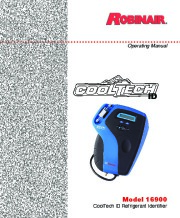 Robinair SPX 16900 CoolTech Refrigerant Identifier Owners Manual - 1 of 28
Robinair SPX 16900 CoolTech Refrigerant Identifier Owners Manual - 1 of 28 Robinair SPX 16900 CoolTech Refrigerant Identifier Owners Manual - 2 of 28
Robinair SPX 16900 CoolTech Refrigerant Identifier Owners Manual - 2 of 28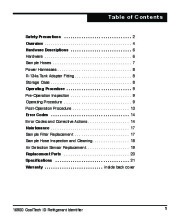 Robinair SPX 16900 CoolTech Refrigerant Identifier Owners Manual - 3 of 28
Robinair SPX 16900 CoolTech Refrigerant Identifier Owners Manual - 3 of 28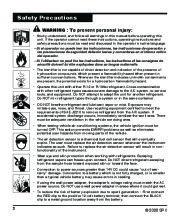 Robinair SPX 16900 CoolTech Refrigerant Identifier Owners Manual - 4 of 28
Robinair SPX 16900 CoolTech Refrigerant Identifier Owners Manual - 4 of 28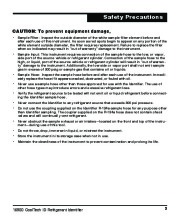 Robinair SPX 16900 CoolTech Refrigerant Identifier Owners Manual - 5 of 28
Robinair SPX 16900 CoolTech Refrigerant Identifier Owners Manual - 5 of 28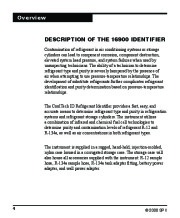 Robinair SPX 16900 CoolTech Refrigerant Identifier Owners Manual - 6 of 28
Robinair SPX 16900 CoolTech Refrigerant Identifier Owners Manual - 6 of 28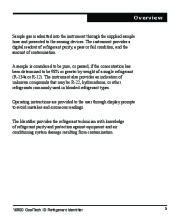 Robinair SPX 16900 CoolTech Refrigerant Identifier Owners Manual - 7 of 28
Robinair SPX 16900 CoolTech Refrigerant Identifier Owners Manual - 7 of 28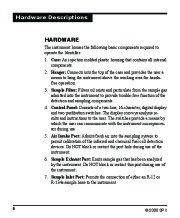 Robinair SPX 16900 CoolTech Refrigerant Identifier Owners Manual - 8 of 28
Robinair SPX 16900 CoolTech Refrigerant Identifier Owners Manual - 8 of 28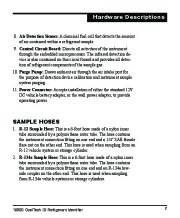 Robinair SPX 16900 CoolTech Refrigerant Identifier Owners Manual - 9 of 28
Robinair SPX 16900 CoolTech Refrigerant Identifier Owners Manual - 9 of 28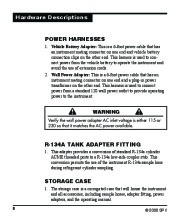 Robinair SPX 16900 CoolTech Refrigerant Identifier Owners Manual - 10 of 28
Robinair SPX 16900 CoolTech Refrigerant Identifier Owners Manual - 10 of 28